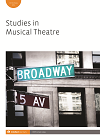- Home
- A-Z Publications
- Studies in Musical Theatre
- Previous Issues
- Volume 15, Issue 1, 2021
Studies in Musical Theatre - Volume 15, Issue 1, 2021
Volume 15, Issue 1, 2021
- Editorial
-
- Articles
-
-
-
Missing: A Musical Dramedy: Engaging with the missing through the perpetually present
More LessAuthors: Annika C. Speer and Chari ArespacochagaMissing uses a historical reimagining of the murder of JonBenét Ramsey as a launchpad to examine what it is like for a woman of colour to be inundated in a sexist and racist media and cultural spin-cycle. The script tells the story of a young Black girl, Nancy, coming of age and absorbing these cultural messages. In Act 1, Nancy, a child beauty pageant contestant, learns about the death of her friend, JonBenét. Nancy is simultaneously drawn in, obsessed and repulsed by the media storm that follows. In Act 2, indelibly shaped by this childhood event and inspired by her role model Diane Sawyer (pageant winner turned news anchor), Nancy has grown up to be a reporter. She now finds herself peddling similarly problematic stories for ratings and clickbait. Nancy struggles increasingly with both the erasure of identities like her own and the salacious eagerness through which the media (now her job) capitalizes on violence against women in general. The title Missing stems from ‘missing white woman syndrome’ a phrase coined by PBS journalist Gwen Ifill and subsequently adopted by social scientists to refer to the immensely uneven media coverage favouring victims who are upper/middle-class white girls/women in contrast to the coverage and framing of victims of colour. A key goal of the play is to underscore and then question the dominant media representations of women whose stories garner mainstream attention. Whose stories get told? How are they framed? Who, in turn, are marginalized and ignored? How can artists engage representational inequity without inadvertently piling more attention on the already visible? Musicals can and should tackle questions of systemic inequity and inclusion; doing so requires more than positioning protagonists of colour in a theatrical world that fails to acknowledge the systemic realities of our actual one. Missing, a collaborative project in process, tackles these questions.
-
-
-
-
The future of musical theatre: An animation of a video call between collaborators, 30 September 2020
More LessAuthors: Joy Brooke Fairfield, Krista Knight and Barry BrinegarIn the first autumn of the COVID-19 pandemic, long-time theatre collaborators in two different cities in the US South discuss the future of an art form that has currently gone dark. Influenced by punk culture, twenty-first-century internet aesthetics, social justice movements and their pets, this decade-strong creative team reflects in a multimedia format on their past work and enumerates their priorities for the future of musical theatre: cheap, remote, inexperienced, local, radical and full of women and sexual/gender minorities.
-
-
-
The utopic vision of OSF’s Oklahoma!: Recuperative casting practices and queering early American history1
More LessIn the spring of 2018, the Oregon Shakespeare Festival (OSF) realized artistic director Bill Rauch’s decades-long dream: to produce a queer, interracial Oklahoma!. The production participates in a new practice of recasting history through musical theatre, and does so through an innovative approach to representation and character. OSF’s production reimagined Curly as a queer Black woman; the matriarch of the town, Aunt Eller, as a trans woman; and the secondary romantic couple, Will Parker and Ado Annie (here Ado Andy), as an interracial, gay male partnership. This alteration of the characters’ identities takes a bold new step in the trajectory of theatrical casting practices, challenging the entrenched white supremacy and patriarchy of the theatre industry. In this article, I situate OSF’s method of casting Oklahoma!, which I call ‘recuperative casting’, in the landscape of broader discourse related to casting and musicals that represent US history; I argue that this casting strategy seeks to remedy the whitewashing typical of productions of canonical musicals.
-
- Reviews
-
-
-
Children, Childhood, and Musical Theater, Donelle Ruwe and James Leve (eds) (2020)
More LessReview of: Children, Childhood, and Musical Theater, Donelle Ruwe and James Leve (eds) (2020)
New York: Routledge, 264 pp.,
ISBN 978-1-47247-533-6, h/bk, $128.00
-
-
-
-
Sweet Mystery: The Musical Works of Rida Johnson Young, Ellen M. Peck (2020)
More LessReview of: Sweet Mystery: The Musical Works of Rida Johnson Young, Ellen M. Peck (2020)
Oxford: Oxford University Press, 304 pp.,
ISBN 978-0-19087-359-2, h/bk, £21.83
-
-
-
Black Is King, Beyoncé Knowles-Carter, Kwasi Fordjour, Emmanuel Adjei, Blitz Bazawule, Ibra Ake, Jenn Nkiru, Jake Nava, Pierre Debusschere and Dkayl Rimmasch (dirs) (2020)
More LessBy Jordan EaleyReview of: Black Is King, Beyoncé Knowles-Carter, Kwasi Fordjour, Emmanuel Adjei, Blitz Bazawule, Ibra Ake, Jenn Nkiru, Jake Nava, Pierre Debusschere and Dkayl Rimmasch (dirs) (2020)
USA: Disney+
-
Volumes & issues
Most Read This Month


